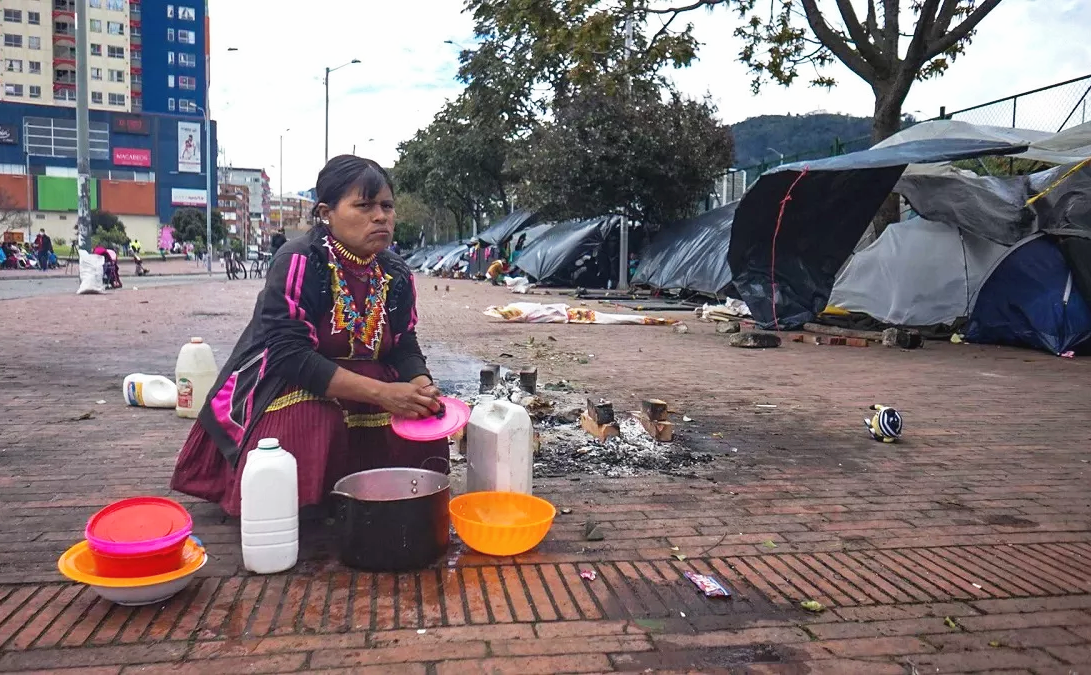Poverty in Latin America and the Caribbean has increased after the pandemic. The recent global economic turmoil has impacted almost a third (29%) of the Latin American and Caribbean population, while extreme poverty reaches 11%. My interest here is the internal composition of this poverty indicator. OXFAM’s EconoNuestra Regional Inequality Report contrasts “the Afro-descendant population (24.3% impoverished) and the indigenous population (43.1% impoverished) with the non-indigenous or Afro-descendant population (19.4% impoverished).” These data highlight developmental processes that produce biased results against indigenous and Afro-descendant populations, indicating a situation of structural racism—a well-known diagnosis.
The figures cited express economic relations, but at the same time refer to processes of inequality of a non-economic nature. As I point out in my book “Racism and Power in Bolivia” (OXFAM/FES, 2021), in our societies, people who are born indigenous (which is a social, not an economic fact) are more likely to be poor — as we have seen, twice as likely — than those who are not. They are also more probable to receive less education, live in poorer housing, have a shorter life expectancy, suffer more alcoholism and other preventable diseases, work hard and alienating jobs that begin in childhood, etc. The Report notes these inequalities as “intersectional”, but does not dwell on them.
José Carlos Mariátegui pointed out in the 1930s that “the problem of an individual of indigenous origin is the problem of the land”. Of course, the native is not a problem for the society. On the other hand, the society is a problem for the native. Indigenous people have the society as a problem because they come from an “original expropriation” in which their capitals were taken from them: not only the productive ones, such as land, but also the educational, cultural (language) and, above all, the symbolic capitals. This situation of subtraction and lack, of historical origin, has been perpetuated over time, and has been justified with all kinds of racist and denialist discourses.
Achieving ethnic-racial equality in the continent requires correcting this massive expropriation, which is only partly economic. The emptying of the indigenous people over five centuries has been much more complex and extensive than that identified by Mariátegui. The Marxists of the 20th century did not conceive of cultural and symbolic deprivations as fundamental. For them, thanks to the revolution, the indigenous peoples would in any case become “civilized,” that is, overcome the “barbarism” in which they had lived since the Colony, “improve their hygiene,” learn Spanish, etc. Their position in this respect was analogous to that of the liberals of the same period, with the difference that the latter made the change rest on education and the expansion of capitalism. Intellectual history proves that the economic and educational progress of indigenous people and Afro-descendants can be considered within a racist ideological framework.
Concentrating on the economic aspect of the “problem” has often been a means of denying the inherited historical conditions. For today’s fashionable liberal-libertarians, the complete deregulation of markets, including educational markets, would make it possible to fulfill the motto: “to each according to his merits”, which seems to them to be the automatic overcoming of ethnic-racial inequality. Of course, they refuse to consider the historically determined character of such “merits”, for example the ability to use Spanish and other European languages. They believe that giving equal rules to unequal individuals produces equality. Or, at any rate, that it frees the world from the “injustice” of giving deprived people a reward for a reason other than their “merits”.
This denialist conception of the colonial past and its determinations on people’s present performance is growing stronger today, and has cancelled some of the actions taken in past decades against the inequality produced by the structural racism of post-colonial and post-slavery societies.
Neoliberal economicism can be an important obstacle to indigenous emancipation, particularly because it is assumed by many indigenous descendants as a strategy for social integration; however, over time it has been proven that making money has not changed their subaltern condition, precisely because the oppression they suffer is much broader than that emanating from income disparity.
The successive processes of modernization in the region have been returning some of the capital taken from the indigenous people. The “easiest” to partially restore have been the economic and educational aspects. However, the social, cultural, and linguistic prestige lost has been, and still is, much more difficult to recover. Many indigenous people escape the structural racism of the societies in which they live through assimilation, that is, by trying to remove the peculiarities of their identity and openly adopting the dominant identity. Nonetheless, this process has a profoundly uneven character. Those who already possess a greater degree of whiteness will always come out of the “whitening process” better off. The others will remain halfway, identifying themselves as “new mixed-race,” but without being completely accepted as such by the traditional mestizos. This is how non-economic inequalities multiply, forming a hierarchical scale that, starting with the traditional placement of indigenous people below and white people above, establishes an infinite number of intermediate combinations and is crisscrossed by multiple racist disputes between identity groups.
However, racism is not indistinctly oriented, as denialism often posits. There is no “reverse racism.” Racist struggles always seek to attribute to others a greater blackness or indigeneity and to their own a greater whiteness. Racism is always anti-indigenous and anti-Afro, even if it is acted out by indigenous and Afro-descendants.
This is so because Latin American social processes occur within a specific historical structure, Euro-centric and US-centric modernity, which establishes the coordinates within which the dominant ideologies (imagination, aesthetics and collective desires, forms of “rationality”, cultural industries, etc.) will move. And this structure is agonistic: it gives the value of “modern” and “progressive” to the capitals of white elites, who identify with their European and North Americans counterparts (even if both do not recognize them as equals), and devalues indigenous and Afro capitals as “traditional”, “from the past” and, at most, “folkloric” or “diverse”.
This means that overcoming structural racism, which is the social propensity to infinitely reproduce ethnic-racial inequality, demands a transformation of this structure, or, in other words, a transformation of how we live within it. It requires changing the unconscious biases of modernity, marked by the serious plundering of more than 500 years. Decolonization is needed.
*Translated by Janaína Ruviaro da Silva from the original in Spanish.













